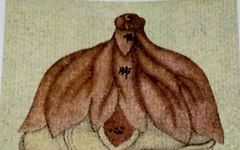Introduction
The Five Organs, namely the Heart, Liver, Spleen, Lung, and Kidney, are collectively referred to as the “Five Zang”. In the theory of meridians, the Pericardium is also considered an organ, thus referred to as the “Six Zang”. The common physiological characteristics of the Five Organs are the transformation and storage of essence and qi, and they can house the spirit, hence called the “Shen Zang”. Although the functions of the Five Organs are distinct, they coordinate with each other to maintain the life process. The physiological activities of the Five Organs are closely related to changes in the natural environment and emotional factors.
1The “Ruler’s Official” of the Human Body — Heart
The “Huangdi Neijing” compares the human body to a country, with a king and various ministers, each responsible for their duties. If everyone performs their tasks well and maintains harmony and order, the country can resist external evils, and the person will enjoy health and longevity. Among the Five Organs, the Heart holds the highest position. TCM theory posits that the Heart is the ruler of life activities in the human body, the supreme commander, as stated in the “Huangdi Neijing”: “The Heart is the Ruler’s Official.” The ruler is the highest authority in a country, governing all citizens. Referring to the Heart as the ruler affirms its importance among the Five Zang and Six Fu.
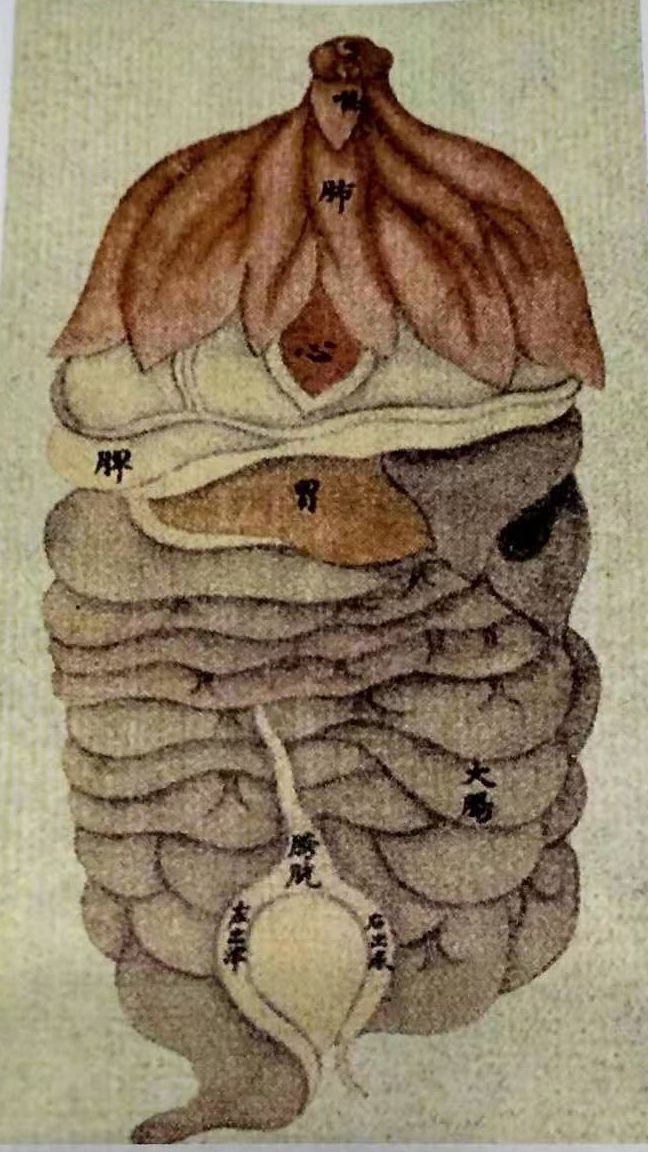
▲ Qing Dynasty illustration of the “Human Organs” One major function of the Heart is to govern the blood vessels. The “Huangdi Neijing” states, “The Heart governs the blood vessels,” indicating the connection between the Heart and the entire body’s blood vessels, clarifying that all blood vessels are directed by the Heart. Anatomically, the Heart functions like a pump, sending blood throughout the body. The “Huangdi Neijing” also points out that blood flows in the vessels “continuously and without rest,” meaning that blood circulates in a cyclical manner, nourishing the organs internally and spreading to the muscles externally, representing an endless operation. The “Huangdi Neijing” clearly outlines several key aspects of blood circulation. In Western medicine, the 2nd-century Roman medical system recognized blood flow like tides but did not understand circulation; the 13th-century Arab medicine began to recognize the small circulation of blood; it was not until 1628 that British physician William Harvey proposed the theory of blood circulation. The “Huangdi Neijing” also has some understanding of arteries and veins, mentioning the distinction between “blood that shoots out” (arterial blood) and “blood that is dark and turbid” (venous blood). Another major function of the Heart is “to govern the spirit and consciousness,” indicating that mental activities, thoughts, and consciousness, as well as the intelligence reflected by these activities, are all presided over by the Heart. When the function of governing the spirit is normal, the spirit is vigorous, and consciousness is clear; conversely, if abnormal, it can lead to symptoms such as palpitations, forgetfulness, insomnia, and mania, which can also disrupt the functions of other organs. Ancient Chinese philosophers and thinkers believed that human thinking, wisdom, and mental activities are reflections of the Heart’s functions, hence the sayings “the Heart’s desires come true” and “the Heart is skillful in action.” In the classic Chinese novel “Dream of the Red Chamber,” Lin Daiyu is praised for her intelligence with the phrase: “The Heart has one more aperture than Bi Gan.” What is the origin of this saying? Bi Gan was a person from the Shang Dynasty who assisted his brother Emperor Yi in governing the Shang, and later assisted Yi’s son, King Zhou, as the chief minister. It is said that Bi Gan had “seven apertures in his Heart”; ancient people believed that having more apertures in the Heart indicated greater intelligence. Thus, sages are considered wise because their Hearts have more apertures than ordinary people, leading to meticulous thoughts. If a person “loses their Heart’s aperture,” they will become confused and mentally unstable. “The Heart governs the spirit” is an important foundational theory in TCM, followed by most physicians throughout history, permeating the entire theoretical system of TCM. How should we understand the spirit? To illustrate, our body is like a car, equipped with all parts and functions. But without a driver, even the best car cannot run. The spirit is like the driver. However, TCM theory does not overlook the role of the brain; the “Huangdi Neijing” states: “The brain is the sea of marrow,” and “the head is the residence of essence and clarity”; Zhang Zhongjing in the “Shanghan Lun” also states: “The head is the leader of the body, where the spirit is focused”; later medical texts also affirm the important relationship between the brain and mental consciousness. Furthermore, the meaning of the Heart governing the spirit also indicates that the Heart is the ruler of human life activities, commanding all organs to coordinate with each other to complete various complex physiological activities, thus maintaining human life. If the Heart undergoes pathological changes, the physiological activities of other organs will also become disordered, leading to various diseases. Therefore, likening the Heart to the Ruler’s Official is not an exaggeration at all. 2The “Minister’s Official” of the Human Body — Lung
The “Huangdi Neijing” bestows a high title upon the Lung — “Minister’s Official.” The Minister, or “Prime Minister,” is roughly equivalent to today’s Prime Minister. In the kingdom of the body, the Lung is the chief assistant to the Heart, the highest official under the king, responsible for both internal and external affairs on behalf of the Heart. What tasks does it perform?
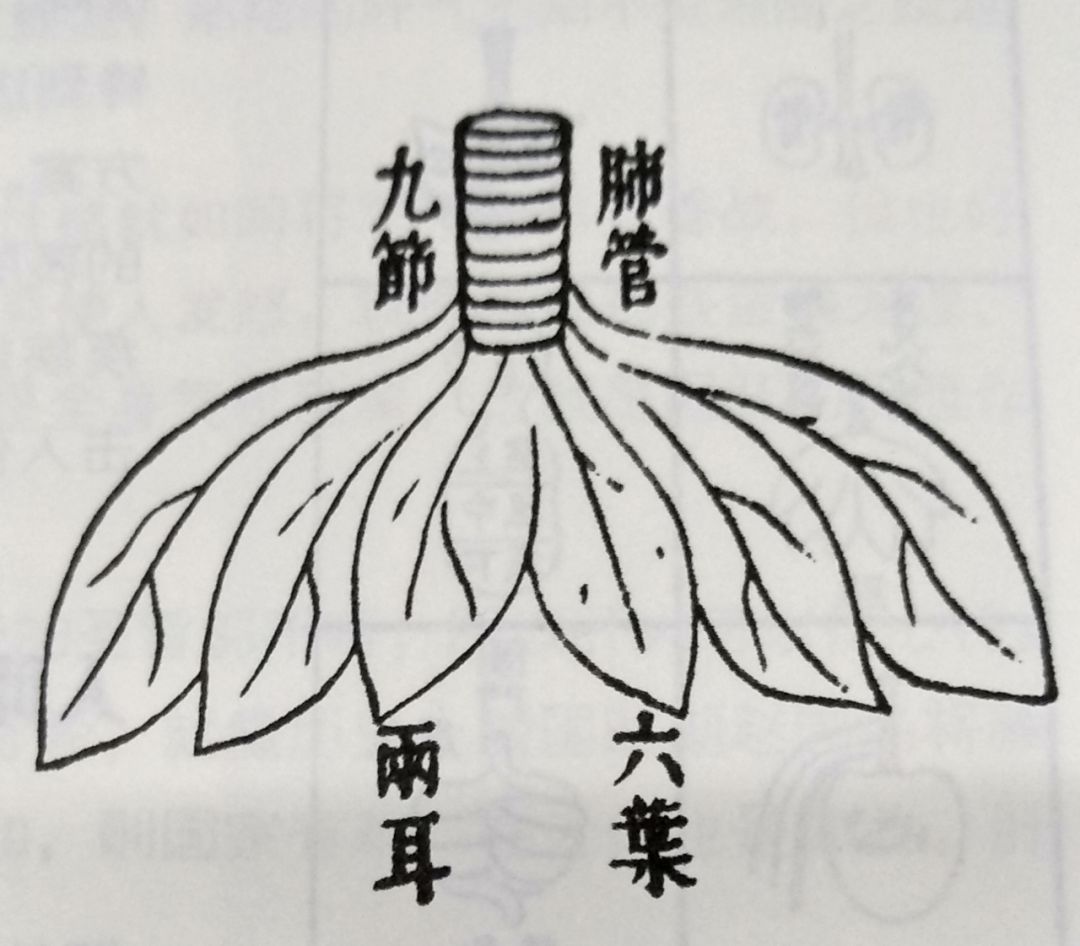
▲ Ming Dynasty illustration of the “Lung” by Zhang JingyueIn TCM theory, the primary function of the Lung is “to govern and regulate, presiding over the qi of the entire body.” The qi of the entire body is under the Lung’s supervision. When we mention qi, we naturally think of breathing. The “Huangdi Neijing” states, “The Lung governs qi and controls breathing.” The Lung maintains the most basic life activities through respiration. “A country cannot be without a ruler for a day” — the Heart’s beating cannot stop for a moment; besides that, we can go several days without food or water, but breathing is absolutely indispensable. Once the Lung ceases its function of inhaling and exhaling, life comes to an end. In a kingdom, the Prime Minister must formulate work plans, coordinate officials, and govern and regulate national affairs. The Lung, as the Prime Minister of the body, has a similar role. This is referred to as “the Lung governs regulation,” meaning that through the Lung’s rhythmic inhalation and exhalation, it regulates various cycles and rhythms in the body’s life activities, governing and adjusting the qi, blood, and body fluids throughout the body. In daily life, if the king wants to understand national affairs, he asks the Prime Minister; similarly, if a physician wants to know the status of the qi and blood of the organs, they inquire of the Lung. The Lung is the Prime Minister of the body, understanding the conditions of the Five Zang and Six Fu, hence the saying “the Lung oversees the hundred vessels,” indicating that the qi of all organs and meridians converges in the Lung meridian. Among the organs, the Lung is positioned highest. The “Huangdi Neijing” also assigns it another title, “Hua Gai,” which refers to the yellow umbrella used by ancient emperors, vividly symbolizing its protective and covering role over the Heart. The Lung stands high and sees far, thus it plays a decisive role in the distribution and transportation of resources throughout the kingdom. The Spleen, which manages the storage of quality resources — refined substances, is directed by the Lung to distribute them throughout the kingdom. Through the “dissemination function,” the Lung releases the refined substances brought by the Spleen to the skin and hair, nourishing and moistening the entire body, while the useless dregs are expelled through various means. The Lung completes a series of physiological functions through its unique dissemination and descending actions. Dissemination means to open and release. Descending means to clear and lower. Dissemination is outward and upward, while descending is inward and downward; these two functions are oppositional yet complementary. TCM theory also holds that “the Lung governs the skin and hair,” as the Lung directly interacts with the atmosphere through the mouth, nose, and skin, possessing a keen ability to sense external seasonal changes and can adjust the body’s physiological functions accordingly, allowing the organs to adapt to various climatic environments. The Lung acts like a commander, leading the troops; when external evils invade, the scouts at the gates — the skin and nasal passages immediately respond, with cold, sneezing, and nasal discharge being their signals for help. The Prime Minister realizes that enemies are approaching and immediately dispatches his elite troops — the Wei Qi as vanguards to the front lines to resist the enemy, subsequently issuing orders to the entire kingdom, requiring all officials to recognize the situation and formulate a battle plan. The Wei Qi is brave and skilled in battle, engaging in fierce combat with external evils at the gates; at this time, the manifestations of disease are all on the body’s surface, which TCM refers to as “exterior syndrome”; if the vanguard is defeated and the enemy breaks through the defenses, the disease penetrates inward. Thus, all officials and citizens — the various organs and meridians must exert effort to combat the invaders, leading the disease into the “interior syndrome” stage.
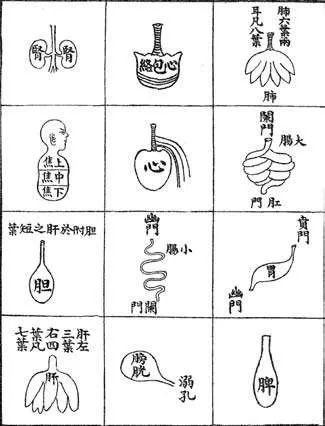
▲ Qing Dynasty physician Wang Qingren (1768-1831) observed the discrepancies between ancient texts and actual anatomical structures, frequently visiting execution grounds to study the internal organ structures, resulting in the work “Corrections in Medical Texts.” The image shows the “Corrected Diagram of Organs” included in the book.3The “General’s Official” of the Human Body — Liver
The “Huangdi Neijing” designates the Liver as the “General’s Official,” the commander of the army, the supreme commander of the nation’s troops. The primary function of the Liver is “to regulate and discharge.” Regulation means to smooth out, and discharge means to release; the Liver facilitates the smooth flow of qi throughout the body, ensuring that all levels of the nation are in their proper places and performing their duties. When the Liver’s regulating and discharging functions are normal, the qi flows smoothly, and a person’s mood is cheerful and optimistic, with the functions of all organs coordinated normally, just like a great general who defends against strong enemies and maintains internal peace, ensuring the king’s rule and safeguarding the nation’s tranquility. The Liver is akin to a nation’s great general, overseeing the military and symbolizing strength. Qing Dynasty physician Zhou Xuehai (1856-1906) stated in his “Essays on Medicine”: “A physician skilled in regulating the Liver is adept at treating all diseases.” From this, we can see the Liver’s significant role in maintaining overall health. If a person frequently experiences anger or depression, it can inhibit the Liver’s regulating and generating functions, leading to qi stagnation. The renowned painter and calligrapher Zheng Banqiao (1693-1765), known for his vast knowledge and talent, faced a difficult career and lived in poverty, compounded by his worries for the world, which led to symptoms of Liver qi stagnation, often feeling chest tightness, discomfort in the ribs, poor appetite, and gradual weight loss. His family sought physicians for treatment, but he was unwilling to see them. One day, he observed the bamboo swaying in the wind outside his window, resilient and unyielding, which inspired him to paint a refined and vigorous “Bamboo in the Wind”. After completing the painting, he hung it in his room, admiring it and feeling delighted. From then on, he painted bamboo daily. After some time, Zheng Banqiao gradually felt relief from his chest tightness, the discomfort in his ribs disappeared, and his appetite improved, with his complexion becoming rosy and radiant. Coincidentally, his friend Zhang Heng visited and was astonished to see him in good health. Zhang Heng, who had some knowledge of medicine, pondered for a moment and realized: “The Liver stores blood and governs the regulation of qi. You are talented but unappreciated, and your worries for the country have caused your Liver to become stagnant. When the Liver does not regulate, qi stagnates, leading to symptoms of chest tightness, sighing, and disharmony between the Liver and Spleen. Later, you frequently painted bamboo, which provided an emotional outlet and allowed the stagnant Liver qi to flow freely. This is the reason behind your painting bamboo to relieve Liver stagnation.”
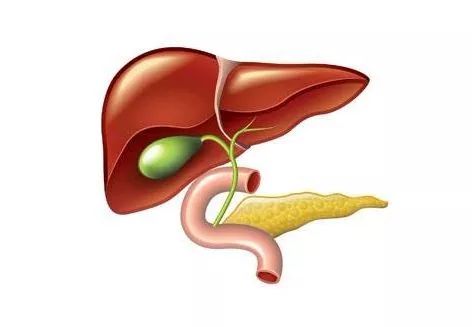
In Chinese culture, when describing a person’s anger, there is a phrase “to stir up Liver fire.” The nature of the Liver is like that of a general, brave and skilled in battle, but also restless and combative; when faced with unfavorable situations, it is prone to erupt in anger. Thus, Liver diseases can easily provoke anger, akin to ancient generals who were unruly and could dominate for a lifetime. When the general is unwell, they lose the ability to control their subordinates, leading to chaotic qi flow throughout the body, which is caused by the dysfunction of the Liver’s regulating and discharging actions. Generals are difficult to manage; as the saying goes, “A general in the field may not heed the emperor’s command”; sometimes they do not even listen to the emperor’s decree, hence Liver fire can disturb the spirit. Originally, the Lung belongs to Metal and can control the Liver Wood, but sometimes the Liver retaliates against the Lung, with military officials refusing to be governed by civil officials, similar to the historical conflict between the famous general Lian Po of Zhao and the civil minister Lin Xiangru, leading to discord between military and civil authorities, which can bring disaster to the nation; the same applies to the body, where Liver fire attacking the Lung can lead to persistent coughing. The Liver also governs blood storage, nourishing the tendons and nails. If Liver blood is insufficient, it can lead to brittle and soft nails or symptoms like “cramps” and numbness. Additionally, the Liver opens to the eyes; if Liver blood is deficient, it can cause dryness of the eyes. 4The “Granary Official” of the Human Body — Spleen
The “Huangdi Neijing” states: “The Spleen and Stomach are the Granary Officials.” Here, the Spleen and Stomach do not refer to the anatomical Spleen and Stomach; rather, in physiological and pathological terms, the TCM concept of Spleen and Stomach encompasses other parts of the digestive system, far exceeding anatomical definitions. TCM refers to the Spleen and Stomach as the “Granary Officials,” meaning they manage the granary as “ministers”; everything we eat is transformed into substances that the body can utilize by them. Before birth, the fetus is nourished by the congenital essence of the Kidney. After birth, all life activities depend on the acquired Spleen and Stomach to intake nutrients. Those with congenital deficiencies can supplement through acquired nourishment, which can also prolong life. However, even with a strong congenital foundation, neglecting the acquired nourishment of the Spleen and Stomach can still lead to illness and shortened lifespan. Thus, the Spleen is rightly called the foundation of acquired essence, the source of life. In ancient agricultural societies, grain was the most important resource for the national treasury. In modern society, the Spleen and Stomach resemble the minister of energy, providing the essential energy for all life activities. Therefore, when treating illnesses, experienced TCM practitioners never forget to regulate the Spleen and Stomach; even when using potent medicines, they always consider protecting the Spleen and Stomach, which is referred to as “with one part of Spleen qi, there is one part of vitality.” During the Jin and Yuan periods, physician Li Gao (1180-1251) conducted extensive research on the Spleen and Stomach, and based on his clinical experiences and those of other physicians, he authored the famous work “On the Spleen and Stomach.” Li Gao believed that “injury to the Spleen and Stomach leads to the emergence of a hundred diseases,” meaning that when the Spleen and Stomach are damaged, digestive and absorption functions become impaired, preventing people from enjoying food and simultaneously affecting their health, leading to various diseases. In addition to participating in the digestion and absorption of food, the Spleen and Stomach have many other functions. “The Spleen governs the muscles” — when Spleen qi is sufficient, the qi and blood flow through the muscles, providing strength. When Spleen qi is deficient, the muscles become weak. Conversely, if one does not exercise or stimulate muscle function, the Spleen and Stomach’s digestive capacity will decline, and appetite will decrease; “the Spleen governs the transportation of water and dampness” — Spleen deficiency can easily lead to edema. When we experience facial and eyelid swelling, we should consider it a Spleen issue. For this reason, when using TCM methods for weight loss, the common approach is not to “drain” but to “tonify,” allowing the Spleen to transport excess water, dampness, and phlegm out of the body, leading to a slimmer figure. Additionally, “the Spleen governs blood” — the Spleen has the function of regulating blood flow within the vessels, preventing it from leaking outside. This is akin to a nationwide oil pipeline; when Spleen qi is deficient and unable to regulate blood, the pipeline’s valves cannot close, leading to bleeding everywhere. “The Spleen governs the rising of clear qi” — the Spleen can transport the refined substances absorbed throughout the body, especially raising the clear yang to the head and face, and can maintain the relative stability of the internal organs in their positions, preventing them from sagging. If Spleen qi does not rise, one may experience dizziness, weakness, loose stools, and possibly symptoms like prolapse or sagging of internal organs. 5The “Foundation of Congenital Essence” — Kidney
The “Huangdi Neijing” states: “The Kidney is the official of strength, from which skills emerge,” considering the Kidney as the foundation of congenital essence, the source of life, from which vitality is continuously released. The Kidney is like the chief steward of the national treasury, who “hides deeply and does not reveal” but possesses significant power. The Kidney is the “foundation of congenital essence,” where the treasures passed down through generations are stored, serving as the startup capital for the nation’s development. Even the source of human life — water must be entrusted to the “great steward of the Kidney” to maintain and regulate the balance of water metabolism in the body, which is the function of “the Kidney governs water.” The Kidney is closely related to human growth and development. TCM holds that when the human body reaches a certain stage of growth and development, the essence stored in the Kidney becomes abundant, leading to the production of a substance called “Tian Gui.” Tian Gui originates from congenital essence and is nourished by the acquired essence from food, gradually becoming abundant, promoting human growth and development and maintaining reproductive functions in both genders. When the body reaches puberty, due to the further abundance of Kidney essence, Tian Gui is produced, allowing males to generate sperm and females to have menstruation. The emergence of Tian Gui marks the maturation of male and female reproductive functions. Conversely, when Tian Gui is depleted, both genders enter menopause and lose the ability to reproduce. In Chinese culture, having large ears is often seen as a symbol of fortune and longevity; many legendary emperors and generals are described as having “full foreheads, square jaws, thick eyebrows, large eyes, and ears that droop to the shoulders.” What does TCM say? TCM believes that thick and large ear lobes are signs of strong Kidney qi. The “Huangdi Neijing” states, “The Kidney governs the bones, produces marrow, and the marrow connects to the brain, its essence is in the hair, and it opens to the ears.” The Kidney is the foundation of congenital essence; sufficient Kidney qi indicates good genetic inheritance and health, leading to a lower likelihood of illness and greater longevity. Isn’t health and longevity a form of fortune?
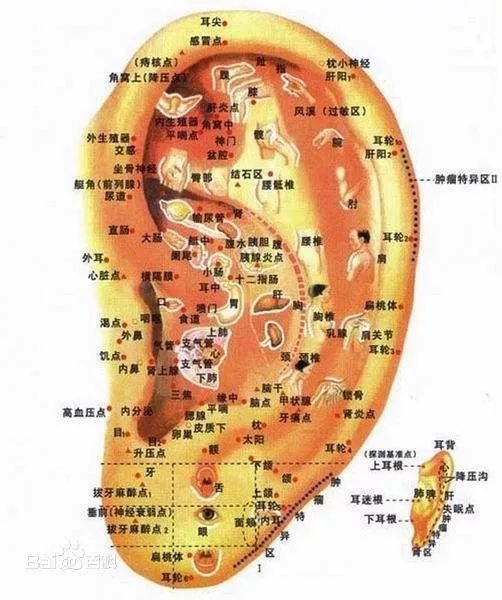
▲ Ear Acupuncture PointsLooking in the mirror, what does our ear resemble? The ear is like an inverted fetus: head down, feet up. The area corresponding to the “head” of the fetus is the ear lobe. Ear acupuncture points refer to specific stimulation points or areas on the ear. When pathological changes occur in the body, reaction points appear on the ear, and stimulating these points can have therapeutic and health-preserving effects. “Ear seeds” are a commonly used method.
▲ This article is sourced from “Chinese Culture — Medicine”
1



Scan to follow us
Learn TCM
Let’s work hard together

